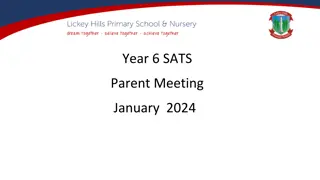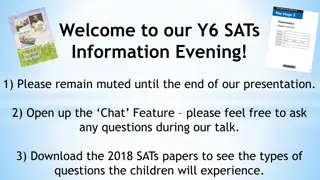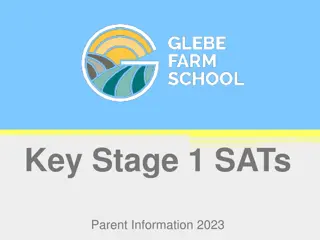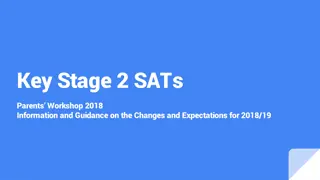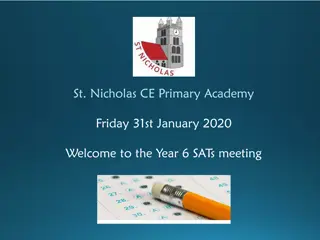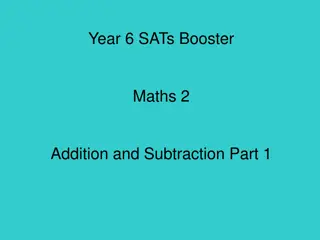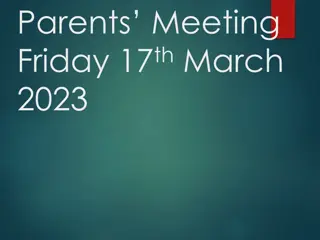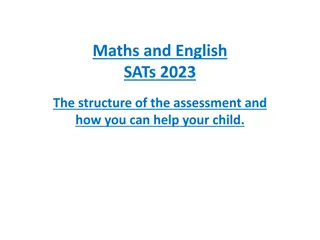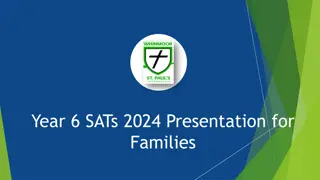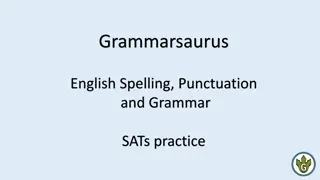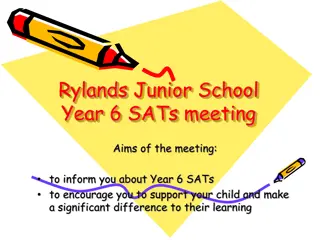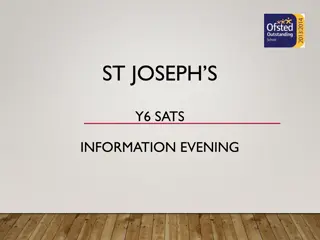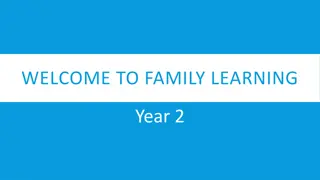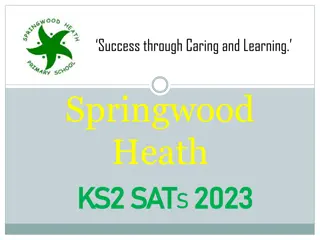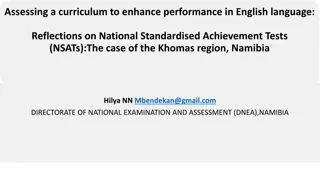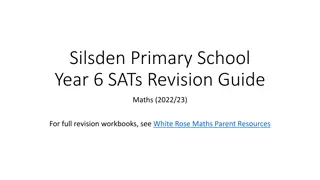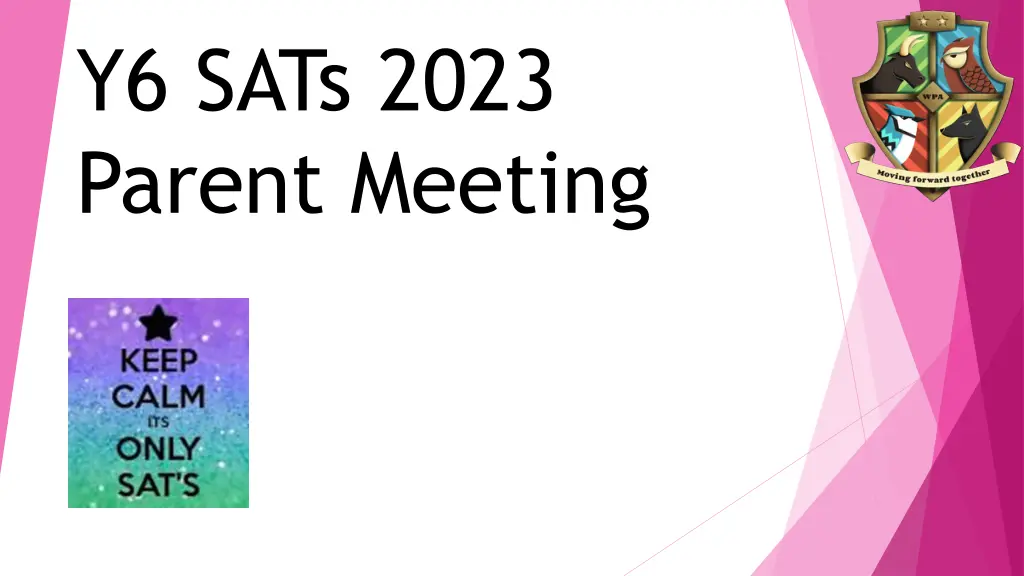
Key Stage 2 Assessments: SATs Overview 2023
Understanding the SATs for Key Stage 2 in 2023, including test dates, subjects, scoring system, and procedures. Get insights on what SATs are, when they are conducted, and how results are reported.
Download Presentation

Please find below an Image/Link to download the presentation.
The content on the website is provided AS IS for your information and personal use only. It may not be sold, licensed, or shared on other websites without obtaining consent from the author. If you encounter any issues during the download, it is possible that the publisher has removed the file from their server.
You are allowed to download the files provided on this website for personal or commercial use, subject to the condition that they are used lawfully. All files are the property of their respective owners.
The content on the website is provided AS IS for your information and personal use only. It may not be sold, licensed, or shared on other websites without obtaining consent from the author.
E N D
Presentation Transcript
Y6 SATs 2023 Parent Meeting
What are SATs? SATs is a term people use to refer to End of Key Stage 2 Assessments; It lasts for four days beginning on Tuesday 9th May 2023 and ending on Friday 12th May 2023 Children will sit the following SATs papers: - Grammar, Punctuation and Spelling (Paper 1) Tuesday 9th May 2023; - Grammar, Punctuation and Spelling (Paper 2) Tuesday 9h May 2023; - Reading Wednesday 10th May 2022; - Maths Paper 1 (Arithmetic) Thursday 11th May 2023; - Maths Paper 2 (Reasoning) Thursday 11th May 2023; - Maths Paper 3 (Reasoning) Friday 12th May 2023. Writing is assessed using evidence collected by your child s teacher throughout Year 6, so there is no Year 6 SATs writing test. There will not be a Science sampling for Year 6 this year. *The key stage 2 tests will be taken on set dates unless your child is absent, in which case they may be able to take them up to 5 school days afterwards.
When and how are they carried out? The tests will take place during normal school hours, under exam conditions; Children are not allowed to talk to each other from the moment the assessments are handed out until they are collected after the test has ended; Afterwards, the completed papers are sent away to be marked externally; The children s results are sent back to school at some point in July; The standard timings of tests differ but last no more than 60 minutes: - Grammar, Punctuation and Spelling (Paper 1) 45 minutes; - Grammar, Punctuation and Spelling (Paper 2) 15 minutes; - Reading 60 minutes; - Maths Paper 1 (Arithmetic) 30 minutes; - Maths Paper 2 (Reasoning) 40 minutes; - Maths Paper 3 (Reasoning) 40 minutes. Some children may require specific arrangements and we will speak to those parents individually before hand. We will practise the routines so it won t be a surprise to the children and they will know the routines on the day.
What sort of results are reported? Once marked, the tests will be given the following scores: o A raw score (the total number of marks achieved for each paper); o A scaled score (which is explained below); o A judgement of whether the National Standard has been met. After marking each test, the external markers will convert each raw score into a scaled score to show whether each child is working below, at or above the national standard. When the scaled score is given, it is given in a range from 80 to 120. A scaled score of 100 or more is meeting the national standard. There are no separate tests for higher achieving pupils; however, a scaled score close to 120 would show that a child is working above the national standard.
What sort of results are reported? Subject Reading Maths GPS Raw Score (2019) Raw Score (2022) 28 58 36 29 58 35 These are the raw scores needed to get 100 on the scaled score. As you can see they Move the goalposts slightly each year.
Grammar, Punctuation and Spelling - SPAG Grammar, Punctuation and Spelling is made up of two papers which will take place on Tuesday 9th May 2023: Paper 1 is the longer paper lasting 45 minutes, children will be tested on grammar, punctuation and spelling generally; Paper 2 is a shorter paper lasting 15 minutes, where children will be tested on spelling only they are asked to fill in a blank within a sentence, attempting to spell out the spelling word in context correctly. Children need to write as neatly as possible so that their answers are legible
Grammar, Punctuation and Spelling Paper 1 Grammar, Punctuation and Spelling (Paper 1) is the longer paper lasting 45 minutes, which takes place on Tuesday 9th May 2023. The children are prepared so they are equipped with a good knowledge of the technical vocabulary needed to identify and describe various aspects of grammar and punctuation marks. Results so far have been very promising! Grammar, Punctuation and Spelling (Paper 1) focuses on the following areas: - Grammatical terms/word classes; - Functions of sentences; - Combining words, phrases and clauses; - Verb forms, tenses and consistency; - Punctuation; - Vocabulary; - Standard English and formality. Grammar, Punctuation and Spelling (Paper 1) requires a range of answer types such as circling missing capital letters, multiple choice questions, one-word answers, but does not require longer formal answers.
Grammar, Punctuation and Spelling Paper 1 Example questions:
Grammar, Punctuation and Spelling Paper 2 Grammar, Punctuation and Spelling (Paper 2) is the shorter paper lasting 15 minutes, which takes place on Tuesday 9th May 2023. Example questions:
Reading The Year 6 Reading SATs paper will be sat on Wednesday 10th May 2023. The assessment has been designed to measure whether children s comprehension of age-appropriate reading material meets the national standard. It a standard timing of 60 minutes, including reading the texts and answering questions. There are three different set texts for the children to read, which could be any combination of non-fiction, fiction and/or poetry. The Reading paper focuses on the following areas known as Content Domains: 2a) give/explain the meaning of words in context; 2b) retrieve and record information/identify key details from fiction and non-fiction; 2c) summarise main ideas from more than one paragraph; 2d) make inferences from the text/explain and justify inferences with evidence from the text; 2e) predict what might happen from details stated and implied; 2f) identify/explain how information/content is related and contributes to meaning as a whole; 2g) identify/explain how meaning is enhanced through choice of words and phrases; 2h) make comparisons within the text. The Year 6 Reading SATs paper requires a range of answering styles, including responding to multiple choice questions, one-word answers, and multiple mark questions which require more formal paragraph-length answers.
Reading Example question, based on Text 1 Space Tourism: 2b) retrieve and record information/identify key details from fiction and non-fiction
Reading Example question, based on Text 3 The Lost World: 2e) predict what might happen from details stated and implied
Reading Example question, based on Text 3 The Lost World: 2e) predict what might happen from details stated and implied
Reading Since the current testing format for the Year 6 SATs began in 2016, there has been a tendency for the number of marks to go in favour towards three particular types of content domain / questions. For example, in 2021: - Over 20% of marks could be gained by answering questions where children had to give/explain the meaning of words in context (Content Domain 2a); - Over a quarter of marks could be gained by answering questions where children had to retrieve/record information or details from the texts (2b); - Almost half of the marks were allotted to questions requiring children to make inferences from a text, justifying inferences with text evidence (2d). So, when reading with your child at home, try asking questions to make them think about the settings and characters.
Maths Paper 1 - Arithmetic Maths Paper 1 (Arithmetic) will take place on Thursday 11th May 2023. It has a standard timing of 30 minutes and is worth a total of 40 marks. It covers the four operations (division, multiplication, addition, subtraction and mixed operation calculations requiring BIDMAS), as well as number properties, calculating percentages of amounts, calculations using decimals, and calculations using fractions. Example question:
Maths Paper 1 (Arithmetic) Example questions: 22 87 5.87 + 3.123 8.993 - 65 22 8.993 60 (30 - 24) 60 6 = 10 10% of 3,000 = 300 20% of 3,000 = 600 10 600 17
Maths Paper 1 - Arithmetic Maths Paper 1 (Arithmetic) will take place on Thursday 11th May 2023. It has a standard timing of 30 minutes and is worth a total of 40 marks. It covers the four operations (division, multiplication, addition, subtraction and mixed operation calculations requiring BIDMAS), as well as number properties, calculating percentages of amounts, calculations using decimals, and calculations using fractions. The children s 10 minute test sheets for homework cover every type of question. Try to do the questions in 10 minutes. Encourage your child to answer all the questions if they can. Mark the answers and then talk about a questions that they are unsure about. We encourage each child to write down methods in their MATHS JOURNALS. Every Monday the children will have the opportunity to go through the homework in class with peer support, with a teacher or in our before school revision club for those that attend.
Maths Paper 2 & 3 Reasoning Maths Paper 2 (Reasoning) will take place on Thursday 11th May 2023. Maths Paper 3 (Reasoning) is scheduled for Friday 12th May 2023. Both have standard timings of 40 minutes and are worth 35 marks each. These papers require children to demonstrate their mathematical knowledge and skills, as well as their ability to solve problems and their mathematical reasoning. Questions focus on the following Mathematical topic areas: - Number and place value including Roman Numerals; - Addition, subtraction, multiplication and division (calculations); - Geometry properties of shapes; - Geometry position and direction; - Statistics; - Measurement including length, perimeter, mass (weight), volume, time and money; - Algebra; - Ratio and proportion; - Fractions, decimals and percentages. The questions get harder throughout the paper. It is not unusual for a child to be unable to complete the entire paper in time.
Maths Paper 2 & 3 Reasoning Example questions:
Maths Paper 2 & 3 Reasoning Example questions:
Maths Paper 2 & 3 Reasoning Example questions:
Maths Paper 2 & 3 Reasoning Example questions:
Maths Paper 2 & 3 Reasoning Example questions:
How can I support my child in preparing for their SATs? Firstly, a positive attitude goes a long way so as much encouragement and support as possible (but we don t need to tell you that!) Some further tips: direct any questions or concerns you have about SATs to myself or Mr. Smith, and we will do everything we can to answer/help; try to provide a quiet corner of the house for homework and study, that s as free from distractions as possible; encourage your child to talk to their teacher or another adult they trust if they express persisting anxieties about SATs. Remember that a small amount of anxiety is normal and not harmful; plan something nice and fun for the weekends before and after SATs this will help your child start the week well and also give them something to look forward to; ensure your child is eating and drinking well, and getting a suitable amount of sleep.
How can I support my child in preparing for their SATs? DO NOT USE PAST PAPERS if your child has a tutor, insist they do not use them too we will be using them! However, there are other Help for SATs resources available on the internet and in shops. Including books and mini assessments. BBC Bitesize have lots of little clips There are websites aimed at parents wanting to help with their child s homework The School Run Primary Homework Help Woodlands
How can I support my child in preparing for their SATs? Above all, remember it is only a few days of their school life and though they should want to do their best, it does not: define them, demonstrate their wonderful and unique personalities highlight positive personal characteristics reflect their amazing talents! SAT s Breakfast Club will run each morning in the studio. It s a good way to help children settle down and relax with their friends before the tests.
Thank you for your continued support Questions


